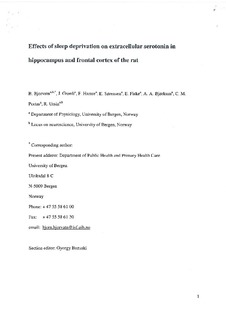Effects of sleep deprivation on extracellular serotonin in hippocampus and frontal cortex of the rat
Bjorvatn, B; Grønli, J; Hamre, F; Sørensen, E; Fiske, E; Bjorkum, Alvhild Alette; Portas, CM; Ursin, R
Journal article
Permanent lenke
http://hdl.handle.net/11250/2482212Utgivelsesdato
2002Metadata
Vis full innførselSamlinger
Sammendrag
Sleep deprivation improves the mood of depressed patients, but the exact mechanism behind this effect is unclear. An enhancement of serotonergic neurotransmission has been suggested. In this study, we used in vivo microdialysis to monitor extracellular serotonin in the hippocampus and the frontal cortex of rats during an 8 h sleep deprivation period. These brain regions were selected since both have been implicated in depression. The behavioral state of the animal was continuously monitored by polygraphic recordings during the experiment. Sleep deprivation produced a gradual decline in extracellular serotonin levels, both in the hippocampus and in the frontal cortex. In order to investigate whether the reduction in serotonin was due to other factors than sleep deprivation, i.e. time of day effect, another experiment was performed. Here animals were allowed to sleep during most of the recording period. This experiment showed the expected changes in extracellular serotonin levels: consistently higher levels in the awake, non-sleep deprived animals compared to during sleep, but no time of day effect. The reduction in extracellular serotonin during sleep deprivation may suggest that serotonin does not play a major role in the mood-elevating effect of sleep deprivation. However, since 5-HT levels are strongly behavioral state dependent, by eliminating sleep, there may be a net increase in serotonergic neurotransmission during the sleep deprivation period. Copyright 2002 IBRO
